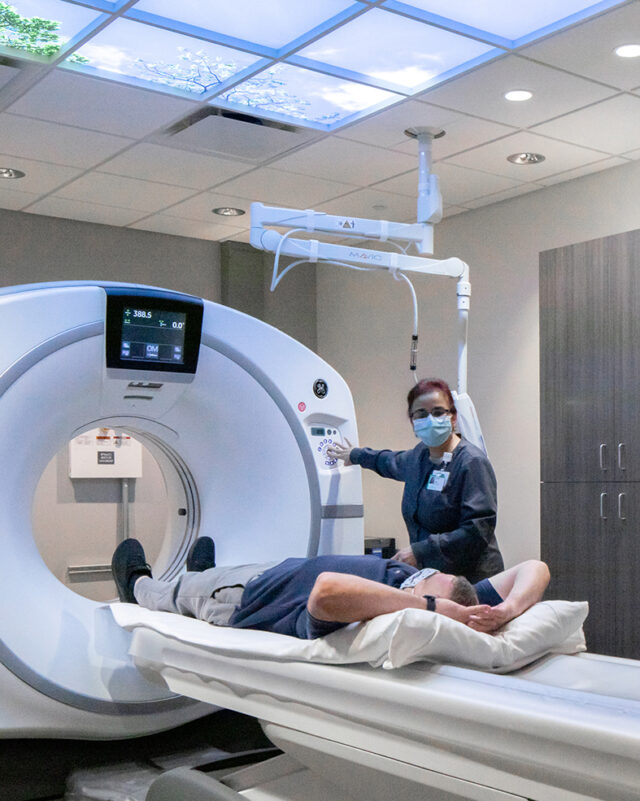Cancer Screening Services
Detecting cancer early – when it is most treatable with the least invasive measures – is key to every individual’s long-term health and well-being. Thankfully, there are a variety of screenings that can be done before you have any signs or symptoms of breast, colorectal, lung or prostate cancer.
You’ll want to talk with your doctor about when and how often you should be screened. Depending on your personal health history, family health history or screening results, your doctor may recommend a different screening schedule.
We offer four critical cancer screenings that may be important for you. Review the information below to learn more.

Breast Cancer Screening
Convenient locations and cutting-edge 3D mammography technology at all of our breast cancer screening sites makes it easier than ever to schedule into employees’ busy lives. We offer next-day appointments, same-day mammogram results, same-day biopsies and openings in the evening and on the weekend. Our experienced, board-certified radiologists read more than 29,000 diagnostic exams a year. We also use the latest in advanced biopsy options, such as ultrasound-guided, MRI-guided and stereotactic breast biopsies should we spot a potential problem during a mammogram.
Guidelines for mammography screening
We follow the American College of Radiology and the Society of Breast Imaging recommendation that women with average risk should get an annual mammogram starting at age 40. However, women considered to be at high risk should talk to their doctor about starting earlier.
We perform more than 42,000 mammograms a year. Every woman who comes to our Breast Imaging Center for screening receives a complimentary risk assessment before her mammogram is performed.
Our Breast Center was the first in the Chicago area to offer automated breast ultrasound, or ABUS, 3D screenings—the only technology developed and approved by the FDA for screening women with dense breast tissue.
To continue this legacy of excellence, we have developed a High Risk Breast Program. It uses the latest technology and evidence-based medicine to evaluate patients’ personal and family histories to determine if they may have a higher-than-average risk for developing breast cancer.
Mammograms can be scheduled by calling 847-618-3700.
3D mammograms will be performed unless specifically instructed otherwise by the ordering doctor. 3D mammograms are covered by Medicare, Medicaid and Illinois law.
Think Pink and Get Your Mammogram
Michelle and Estelle’s Stories
Colorectal Cancer Screening
Many people don’t realize that colorectal cancer is highly preventable. The American College of Gastroenterology recommends colonoscopy screenings beginning at age 45 for all patients. Considerations for patients’ medical and family histories may also indicate they require a screening earlier in life.
Colonoscopies have long been considered the gold standard for colorectal cancer screening and detection. Unlike other cancer screenings which can only detect a problem, a colonoscopy could prevent colorectal cancer by removing precancerous polyps during the exam. Removal of polyps prevents up to 90 percent of colorectal cancer.
Both our hospital GI Center and Endoscopy Center in Arlington Heights use state-of-the art diagnostic technology and high-definition imaging. Because of this, our detection rate for polyps is 57 percent, well above the national benchmark of 25 percent.
To schedule a screening, you should obtain an order from your provider, then call 847-618-9550.
You can also call the number to schedule an appointment with a gastroenterologist to discuss screening and your personal risks for the disease.
Colorectal Cancer Risk and Screening
Moira’s Story – Colonoscopy Screening
Early Lung Cancer Screening
A lung cancer screening with low-dose CT (LDCT) has been shown by research to save lives by finding lung cancer early in people who are considered high risk.
At this time, only those considered high risk are eligible for the screening. However for those who do qualify and undergo screening, it may allow for the disease to be caught at an early stage when it’s more treatable and there’s a better chance of survival.
Those eligible for LDCT:
- Are between the ages of 55 and 80 and have smoked at least an average of one pack a day for 30 years or the equivalent, such as two packs a day for 15 years
- Are currently smoking or have quit within the past 15 years
- Have no new symptoms of possible lung cancer, such as unexplained weight loss, coughing up blood or new cough
If you think you may be eligible for lung screening, please speak with your healthcare provider. If your provider orders a screening, call 847-618-3700 to schedule an appointment.
Lung Cancer Screening, A Lifesaver
Note: Since the taping of this video, the criteria for CT lung screening has changed as of 3/9/21. The high risk age range changed to 50-80 years of age and the minimum smoking history changed from 30 to 20 pack years (Packs smoked per day X years of smoking).
Mary Jo’s Story – Surviving Lung Cancer
Prostate Cancer Screening
Beginning at age 50, many men start routine blood testing for prostate-specific antigen (PSA). This test helps determine the amount of PSA in a man’s blood. Men with increasingly high levels of PSA may be at greater risk of developing prostate cancer. A digital rectal examination, during which a doctor manually checks the prostate for any unusual lumps, may also be advised.
A thorough discussion with a primary care physician can help men make more informed decisions that weigh the risks and benefits of prostate cancer screening. At NCH, we also have an Active Surveillance Program to help patients with slow-growing, low-risk prostate cancers that may not warrant active treatment for some time, if at all.
Our team of experts can properly diagnose and treat a wide range of prostate issues, including cancer. Schedule a consultation by calling 847-618-3700.